West Hartford Students, Lawmakers and Professionals Stand Up for Pay Equity

Audio By Carbonatix
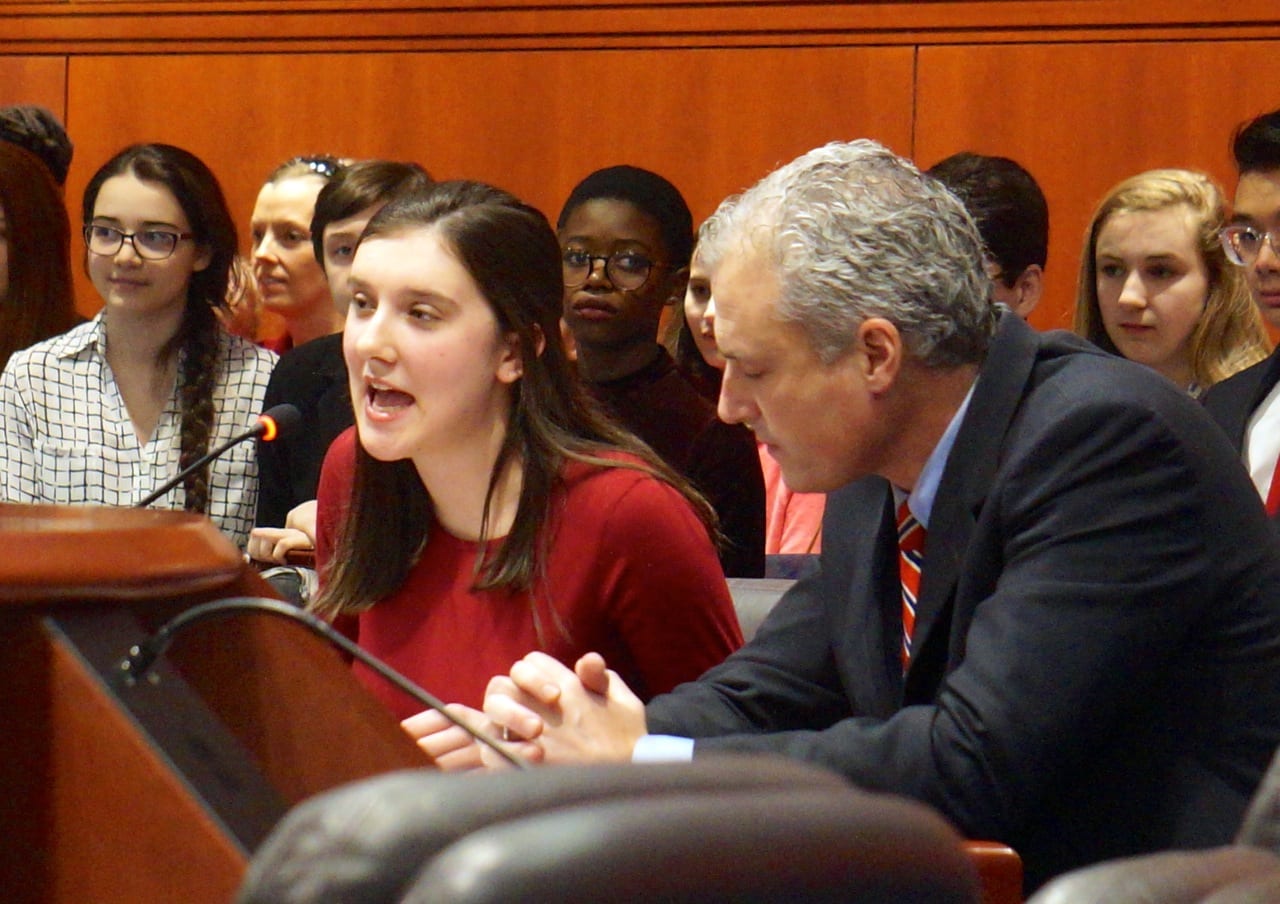
Hall junior Megan Striff-Cave (left), seated with State Rep. Derek Slap, testifies about pay equity at the Legislative Office Building. Photo credit: Ronni Newton
State Rep. Derek Slap was joined by students from West Hartford’s Conard and Hall high schools at the Legislative Office Building in Hartford on Thursday to advocate for legislation to close the gender wage gap and ban the salary history question from job applications.

State Rep. Derek Slap joins students from William H. Hall and Conard high schools at a Labor and Public Employees Committee public hearing Thursday to advocate for equal pay for equal work. Courtesy photo
By Ronni Newton
The Legislative Office Building in Hartford was a sea of red in honor of International Women’s Day, but at an aptly-scheduled hearing Thursday afternoon, the celebration of women was more than just symbolic.
State Rep. Derek Slap (D-19, West Hartford, Avon, Farmington) and a large contingent of other West Hartford residents, including more than a dozen high school students from Conard and Hall, were at the State Capitol to advocate for several pieces of legislation that would help close the gender gap and assist families.
Slap led passage of a pay equity bill in the State House last spring, but was disappointed when it died in the Senate. He’s hopeful that this year it will pass both chambers.
On International Women’s Day, he brought a crowd of high school students from West Hartford to testify before the Labor and Public Employees Committee in support of Senate Bill 15 and House Bill 5386, measures that would, among other provisions, ban the salary history question from the job application process and prevent adverse adjustments to pay for time spent on leave due to pregnancy-related conditions or protected parental, family, and medical leave.
“What’s changed over the past year when it comes to the fight for pay equity in Connecticut? Nothing and everything,” Slap told the Committee.
“Women still earn approximately 80 cents on the dollar for the same job as their male counterpart – costing them on average more than $10,000 a year. The disparity is double for women of color,” Slap said. “The wage gap costs women $418,000 over the course of their career,” he said, and is a factor in the high poverty rate for women over the age of 65.
“Pay equity is not just a woman’s issue, it affects all of us. I tell my two daughters every day that they can be anything they want to be when they grow up. But it breaks my heart that I also have to tell them that chances are they are going to spend their entire careers being underpaid. That has to stop,” Slap said.
The legislation is important to the state’s economy, Slap said. “California, Massachusetts, Oregon, Delaware, and New York City have already taken steps to close the gender wage gap. Connecticut must be next. By strengthening our pay equity legislation, we will be able to remain competitive with surrounding states, increase our workforce talent pool, and attract new residents.”
Hall High School junior Megan Striff-Cave told the Committee that she will personally be impacted by the gender wage gap in less than six years, when she graduates from college and enters the workforce.
“I am going to be working just as hard as my male counterparts. While I will be giving 100 percent to my job, I will only be getting 83 percent back. I want a future where my little sister doesn’t have to make $400,000 less than her twin brother. I want a future where my employer judges me based on what I can achieve not based on the preconceived notions of what women can achieve,” Striff-Cave said.
Conard student Andy Tran said he was raised by a a first-generation immigrant mother who worked a blue-collar job for 15 years even though she was qualified and had worked as an accountant in her native Vietnam. She has suffered the stigma of speaking broken English, which has added to her inability to earn a fair wage.
“Consider in 50 years … what side of history you want to be on,” Tran told Committee members.
“The earliest lesson I ever learned from my parents was to expect less,” Conard junior Grace Evans said at the hearing. “Expect less because I am black. Expect less because I am female.”
The disparity in pay is even greater for minorities, and Evans said that the average black woman makes just 59 cents for each dollar a man earns.
West Hartford Deputy Mayor Beth Kerrigan also came to testify at the Legislative Office Building on Thursday in support of pay equity.
“We need you, who are in power to right a wrong. We shouldn’t have to always rely on the courts to enforce the constitution,” Kerrigan said, recounting gender discrimination she faced early in her career.
Working in production, Kerrigan said she was chatting with a co-worker about their future careers and salaries when she learned there was a disparity. “I didn’t know what I didn’t know. But I knew this. Same degree, same college, same job, different salary was wrong,” she said.
“Discrimination exists. It’s always existed, it’s unfair and it’s time to enforce the equality guaranteed under our constitution. It was not okay when I was in grade school and told I couldn’t deliver our local paper Newsday because ‘it was a boys job and you are a girl.’ It was just accepted as okay. Inequality seen in the rearview mirror is seen for what it really is unconstitutional,” Kerrigan said.
“As a recruiter, I have become numb to the fact that women’s salaries are routinely lower – by $15,000 to $20,000 – than their male colleagues,” said Samantha Foster, a West Hartford resident who is a recruiter for the aerospace and defense industry and a managing director of ZRG Partners.
Foster said the difference in salaries can be stunning, and impacts an entire career. A paradigm shift is needed, she said.
“These women, who have had careers that span decades, have increased their responsibilities, without increasing their compensation fairly. The time is now to strengthen pay equity legislation so that women are not judged for their gender, but for their work performance and ethic,” Foster said.
Dozens of others testified before the Labor and Public Employees Committee, among them House Minority Leader, Republican Themis Klarides.
“This is not a partisan issue … this is about fairness, making sure that people doing the same work get the same pay,” Klarides said, voicing support for legislation to eliminate the salary history question. The measure is about “fairness to people,” she said and not just a “feel good” bill.
Slap said he was pleased to see Klarides voice support for the bill because she opposed it last year.
He is hopeful the House will be able to pass the HB5386 on April 10 – Equal Pay Day.
State Sen. Beth Bye (D-West Hartford) was also at the State Capitol on International Women’s Day, speaking in favor of earned family and medical leave, pay equity, and minimum wage hikes.
“When it comes to a lack of paid family and medical leave, the United States is the only developed country on this planet without it,” Bye said. “We’re lumped in with New Guinea and Suriname and the only three countries in the world not to care for our citizens in this way. Connecticut can be different. We can join other American states and other countries around the world who support families with an earned family and medical leave policy.”
Like what you see here? Click here to subscribe to We-Ha’s newsletter so you’ll always be in the know about what’s happening in West Hartford!
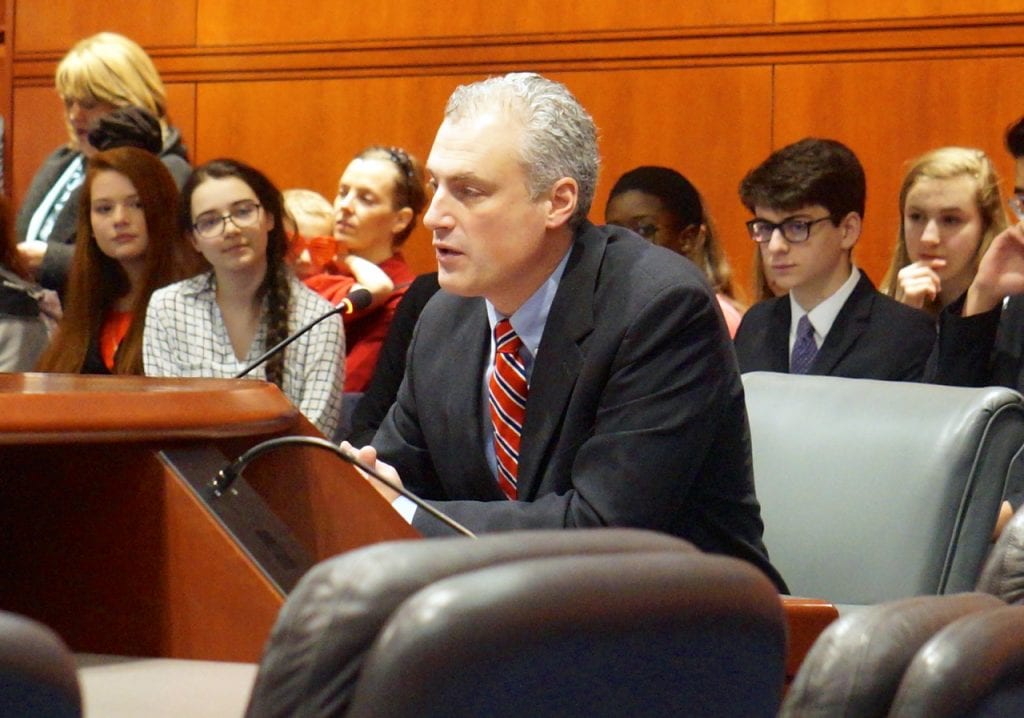
State Rep. Derek Slap speaks in favor of SB15 and HB5386 on International Women’s Day. Photo credit: Ronni Newton
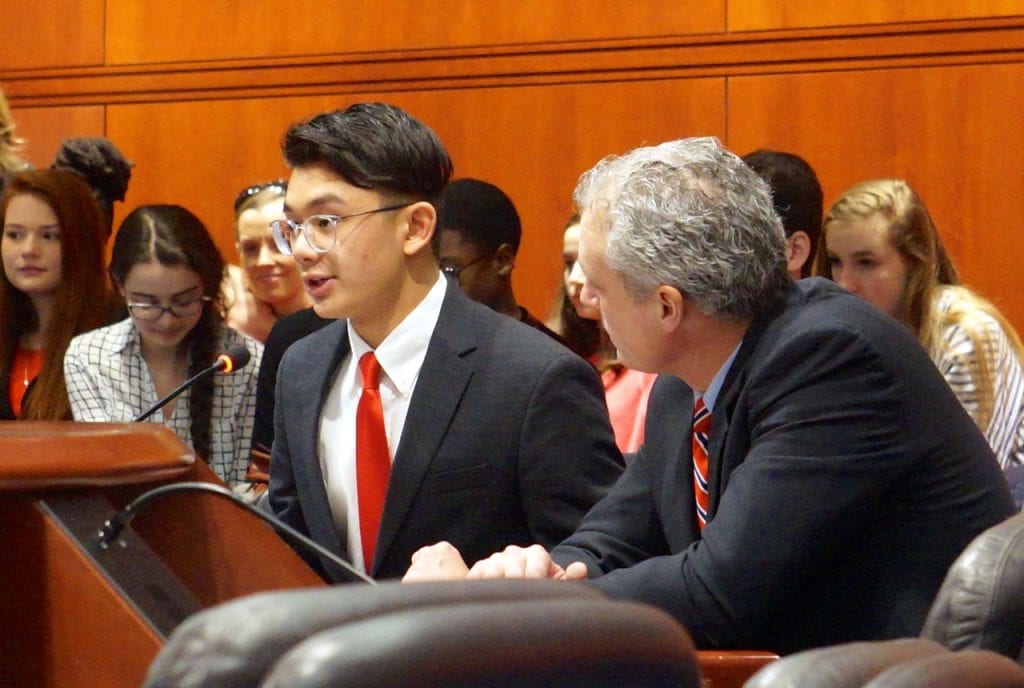
Conard student Andy Tran (left), seated next to State Rep. Derek Slap, speaks to the Labor and Public Employees Committee. Photo credit: Ronni Newton
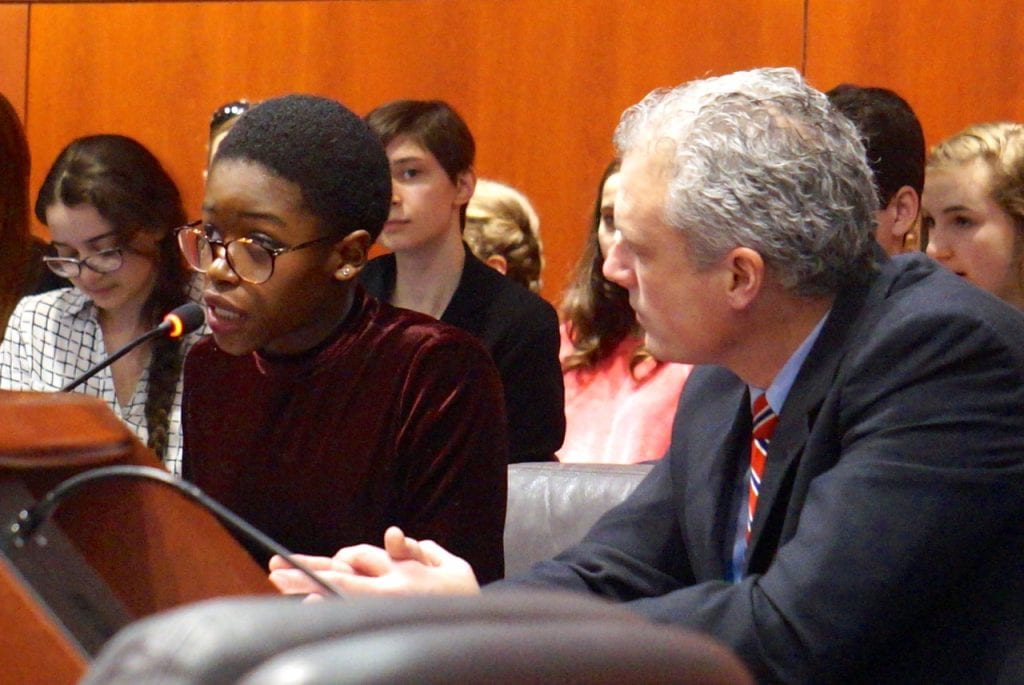
Conard junior Grace Evans (left) was invited by State Rep. Derek Slap to speak about pay equity, and she said she was taught to ‘expect less’ because of her gender and race. Photo credit: Ronni Newton
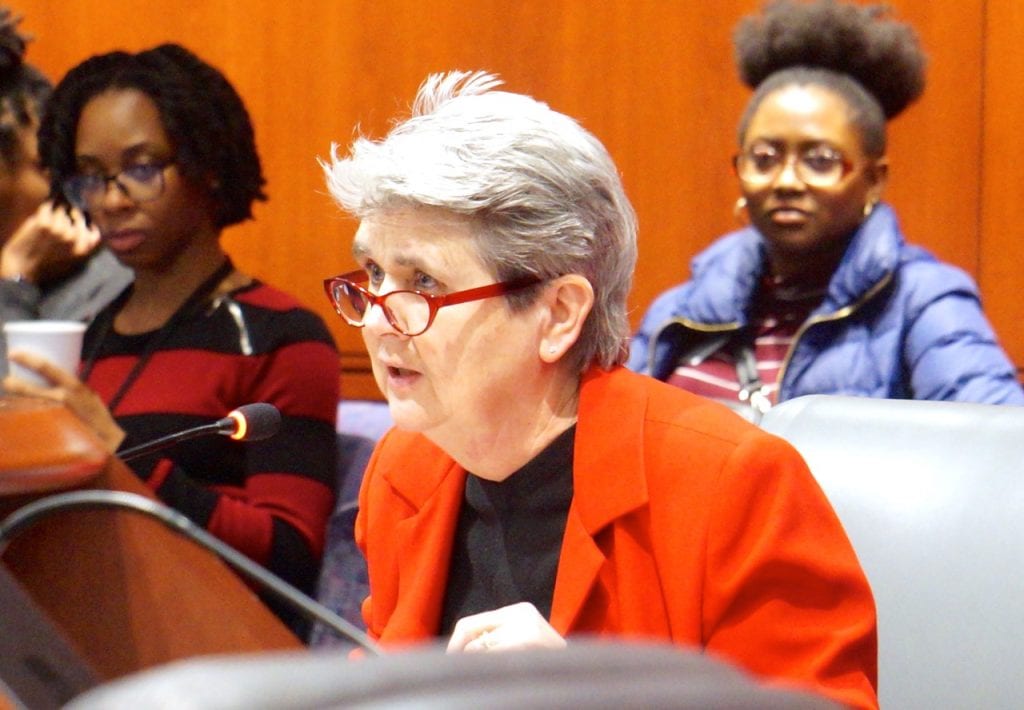
West Hartford Deputy Mayor Beth Kerrigan testifies at the Legislative Office Building about pay equity. Photo credit: Ronni Newton
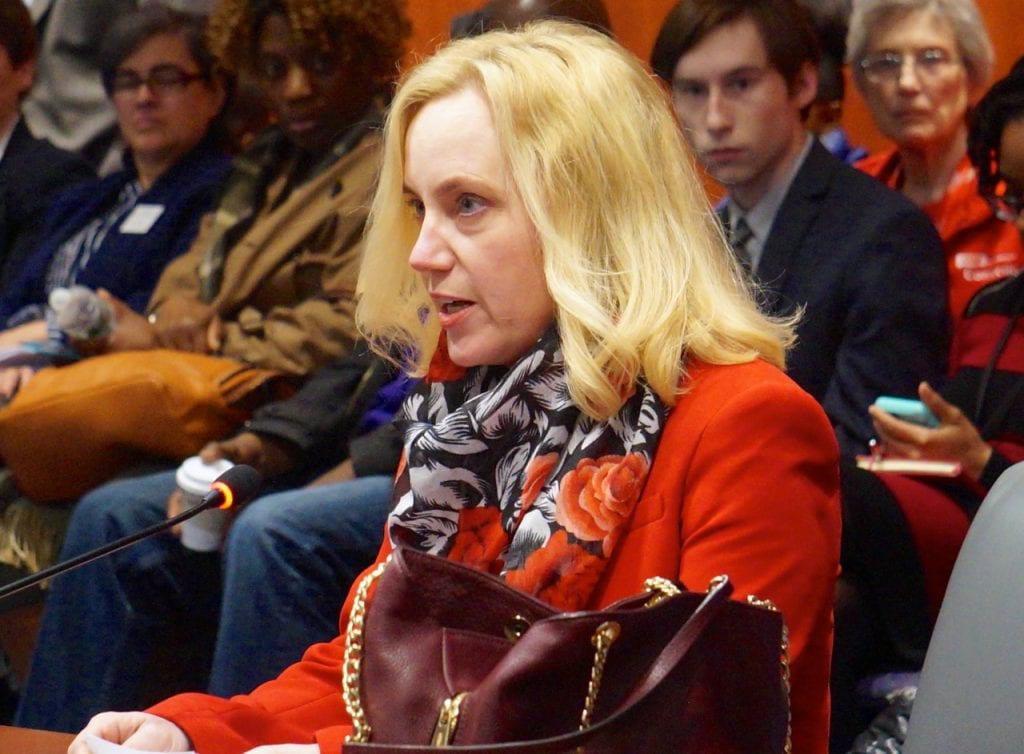
Samantha Foster of West Hartford, a recruiter and managing partner of ZRG Partners, testifies about removing the salary history question from the job application process. Photo credit: Ronni Newton
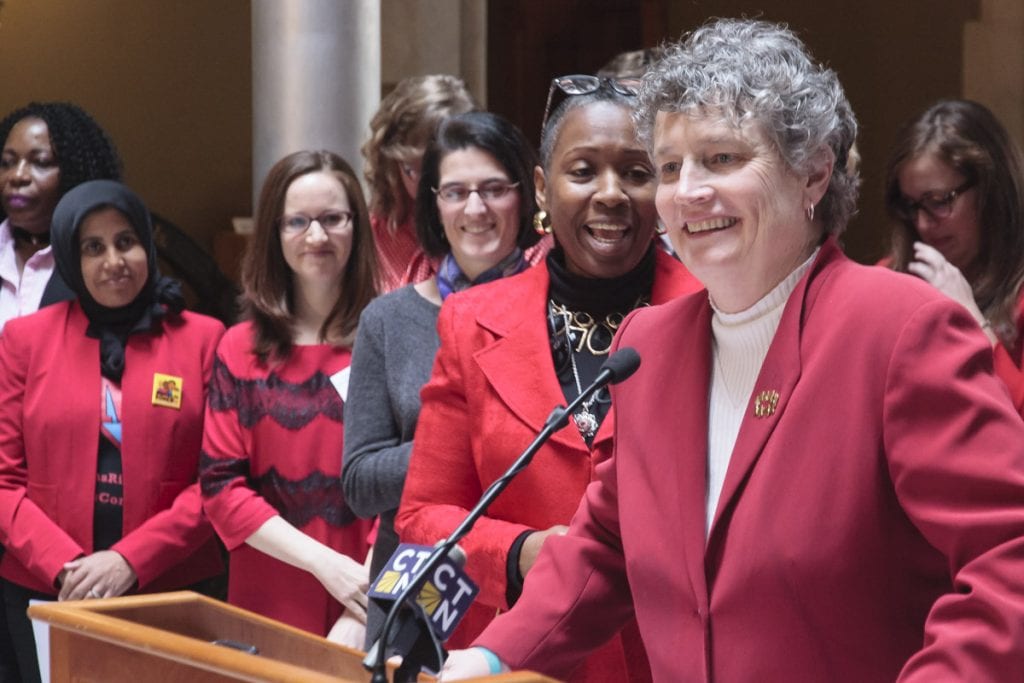
State Sen. Beth Bye at the State Capitol on International Women’s Day. Left of Bye is West Hartford resident Catherine Bailey, deputy director of Connecticut Women’s Education and Legal Fund, an organization leading the effort. Courtesy photo



